Thesis Chapters by Nathan Dawthorne
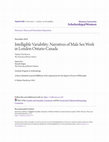
Compared to women, there is limited knowledge concerning men working in the sex trade in Canada. ... more Compared to women, there is limited knowledge concerning men working in the sex trade in Canada. London (Ontario) in particular has been the epicentre of campaigns and lobbying against the sex industry for its alleged exploitation of women. In this environment, most policymakers and service providers argue that men-who-sell-sex are non-existent or are so rare that they are not worth consideration, if they are acknowledged in the first place. Yet other gendered configurations of the sex industry do exist. Given the city’s lack of comprehensive inquiry, this dissertation sets about finding these men and documenting their life histories. This allows for the differentiation of what may be integral to the industry from what is specifically gendered.
From 2015 through 2017, semi-structured and online interviews with 43 men were recorded. The life histories and accounts produced followed linear plots, separated into phases; these offered insights into their childhoods, entrance-into-the-trade, and the fundamentals of sex work. Various details of family life, issues of class, coming-out, sexual abuse, mental health, disability, homelessness, criminality, and addiction weaved throughout different stories. Accounts of choice, female clients, intimacy, friendship, and the non-sexual contradicted archetypes and popular discourse on the nature of the industry.
Mapping the complex relationships men had with social classifications confirms that those in the sex trade face a multitude of stigmas. The subjugation of certain masculinities by hegemonic norms was a major component of this. Accounting for this vulnerability thus challenges assumptions that men are automatically in positions of power based on their gender. While being a man in any one social context made certain things more or less likely to happen, gender affected the interpretations men and others had for their actions. Feelings of oppression were ambiguous; structural vulnerabilities, choice, and need influenced the ways a man felt empowered or powerless.
Regardless of sexuality, hegemonic norms of masculinity also served as tools to counter feminized tropes of helplessness and maintain a sense of dignity. Instead of compartmentalizing the identities and roles of sex workers and dehumanizing them, privileging their stories gave rare insight into their lives and the lives of their clients, proving that seamless and simplistic visions of harm and privilege have been inadequate, where one-size does not fit all.
Papers by Nathan Dawthorne
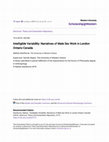
Compared to women, there is limited knowledge concerning men working in the sex trade in Canada. ... more Compared to women, there is limited knowledge concerning men working in the sex trade in Canada. London (Ontario) in particular has been the epicentre of campaigns and lobbying against the sex industry for its alleged exploitation of women. In this environment, most policymakers and service providers argue that men-who-sell-sex are non-existent or are so rare that they are not worth consideration, if they are acknowledged in the first place. Yet other gendered configurations of the sex industry do exist. Given the city's lack of comprehensive inquiry, this dissertation sets about finding these men and documenting their life histories. This allows for the differentiation of what may be integral to the industry from what is specifically gendered. From 2015 through 2017, semi-structured and online interviews with 43 men were recorded. The life histories and accounts produced followed linear plots, separated into phases; these offered insight into their childhoods, entrance-into-the-trade, and the fundamentals of sex work. Various details of family life, issues of class, coming-out, sexual abuse, mental health, disability, homelessness, criminality, and addiction weaved throughout different stories. Accounts of choice, female clients, intimacy, friendship, and the non-sexual contradicted archetypes and popular discourse on the nature of the industry. Mapping the complex relationships men had with social classifications confirms that those in the sex trade face a multitude of stigmas. The subjugation of certain masculinities by hegemonic norms was a major component of this. Accounting for this vulnerability thus challenges assumptions that men are automatically in positions of power based on their gender. While being a man in any one social context made certain things more or less likely to happen, gender affected the interpretations men and others had for their actions. Feelings of oppression were ambiguous; structural vulnerabilities, choice, and need influenced the ways a man felt empowered or powerless. Regardless of sexuality, hegemonic norms of masculinity also served as tools to counter feminized tropes of helplessness and maintain a sense of dignity. Instead of compartmentalizing the identities and roles of sex workers and dehumanizing them, privileging their stories gave rare insight into their lives and the lives of their clients, proving that seamless and simplistic visions of harm and privilege have been inadequate, where one-size does not fit all.
Journal for the anthropology of North America, Apr 1, 2019
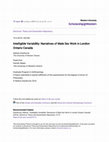
Compared to women, there is limited knowledge concerning men working in the sex trade in Canada. ... more Compared to women, there is limited knowledge concerning men working in the sex trade in Canada. London (Ontario) in particular has been the epicentre of campaigns and lobbying against the sex industry for its alleged exploitation of women. In this environment, most policymakers and service providers argue that men-who-sell-sex are non-existent or are so rare that they are not worth consideration, if they are acknowledged in the first place. Yet other gendered configurations of the sex industry do exist. Given the city's lack of comprehensive inquiry, this dissertation sets about finding these men and documenting their life histories. This allows for the differentiation of what may be integral to the industry from what is specifically gendered. From 2015 through 2017, semi-structured and online interviews with 43 men were recorded. The life histories and accounts produced followed linear plots, separated into phases; these offered insight into their childhoods, entrance-into-the-trade, and the fundamentals of sex work. Various details of family life, issues of class, coming-out, sexual abuse, mental health, disability, homelessness, criminality, and addiction weaved throughout different stories. Accounts of choice, female clients, intimacy, friendship, and the non-sexual contradicted archetypes and popular discourse on the nature of the industry. Mapping the complex relationships men had with social classifications confirms that those in the sex trade face a multitude of stigmas. The subjugation of certain masculinities by hegemonic norms was a major component of this. Accounting for this vulnerability thus challenges assumptions that men are automatically in positions of power based on their gender. While being a man in any one social context made certain things more or less likely to happen, gender affected the interpretations men and others had for their actions. Feelings of oppression were ambiguous; structural vulnerabilities, choice, and need influenced the ways a man felt empowered or powerless. Regardless of sexuality, hegemonic norms of masculinity also served as tools to counter feminized tropes of helplessness and maintain a sense of dignity. Instead of compartmentalizing the identities and roles of sex workers and dehumanizing them, privileging their stories gave rare insight into their lives and the lives of their clients, proving that seamless and simplistic visions of harm and privilege have been inadequate, where one-size does not fit all.
Journal for the Anthropology of North America, 2019

Centering the Margins of Anthropology's History: Histories of Anthropology Annual, Volume 14, 2021
This volume closes with an experimental essay that offers a dynamic, multifaceted perspective tha... more This volume closes with an experimental essay that offers a dynamic, multifaceted perspective that captures one of the dominant (if sometimes marginalized) voices in the history of anthropology. Steven O. Murray’s career developed at the institutional margins of several academic disciplines and activist discourses, but his distinctive voice has been and will remain, at the center of our history.
"...The first is a synthesis of Steve’s research into theory groups, prepared at his request (details below). The second is a collaborative interview based on email correspondence during the last weeks of Steve’s life. He is listed as the first author since he was well aware of the intent of the project and fully invested in its success. Each of the other authors provides a brief introduction to their own role. It is our feeling that this novel approach to an interview should prove more revealing than the standard one-on-one effort."
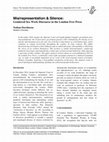
In December 2014, despite the Supreme Court of Canada finding Canada's prostitution laws unco... more In December 2014, despite the Supreme Court of Canada finding Canada's prostitution laws unconstitutional, the Conservative government passed a bill criminalizing the buying of sex and the advertisement of sex for sale. Sex work has a long history as a hot-button topic, and it continues to remain newsworthy throughout the country. This public discussion in some contexts has privileged certain lobbyists and so-called advocates, disregarding or distorting the voices of sex workers themselves. This territory is starkly heteronormative, reinforcing gendered stereotypes and naturalizing certain types of heterosexual behaviour while ignoring a spectrum of other realities. By analysizing depictions of sex work published for 2013 in the London Free Press , a politically centre-right newspaper printed in a midsized Canadian city, this paper provides analysis of articles about sex work in the local-regional context of London, Ontario (Canada). Exposing a Foucauldian rarefaction of discour...
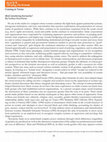
Journal for the Anthropology of North America, 2019
We are in the midst of a zeitgeist where women continue the fight back against patriarchal system... more We are in the midst of a zeitgeist where women continue the fight back against patriarchal systems, misogynist institutions, and toxic masculinities that sanction exploitation and perpetration of various forms of gendered violence. While there continue to be reactionary responses from the usual crowd (e.g. men's rights movement), social and public media continue to sensationalize. Some corporations and organizations have responded by examining oppressive practices and policies, or purging problematic male employees and higher-ups. Gender-budgeting and gender-mainstreaming in public policy aim to reduce inequality by redistributing institutional privileges towards women and away from men. Legislation is passed and government initiatives funded to provide state protection to "good" women and "innocent" girls despite the continued reduction of supports in other sectors. Men are framed appositionally as oppressors and perpetrators in need of policing, regulation, and re-education (Martin 1998). Under these paradigms, certain feminist groups and organizations vie for recognition and resources as they advocate, mobilizing public support often by resorting to competitive victimization, using selective statistics, and only validating certain voices. The need to address the subjugation of disempowered women is not in debate here. Yet female-centred policies and discourses perpetuate a culture of dismissal that further disempowers minority groups. Despite the influence of critical gender perspectives on the feminist movement as well as academia, gender is still a synonym for white woman. When any issue such as sexual violence includes victims of all genders, regardless of to what degree, its framing as a "female issue" designates a social context in which "people are reduced to the merely figural: rhetorical tropes and discursive levers… that pre-empt the very possibility of certain bodies, identities and lives" (Namaste 2000).
Drafts by Nathan Dawthorne
This document outlines and summarizes ethnographic research conducted in London Ontario Canada be... more This document outlines and summarizes ethnographic research conducted in London Ontario Canada between 2015 and 2017 with male sex workers. It serves as a policy brief providing recommendations relevant to the research population.
Books by Nathan Dawthorne
Gendered Lives, 2022
In this chapter, the author explores the experiences of male sex workers in a midsized Canadian c... more In this chapter, the author explores the experiences of male sex workers in a midsized Canadian city. He critiques the legal and political perspectives that portray prostitution as exploitative, regardless of what sex workers say or feel, (re)producing gendered stereotypes of masculinity and femininity and naturalizing a certain type of heterosexual behavior. This, the author argues, overlooks how intersectionality shapes autonomy and vulnerability. Through their stories, the author addresses the structural violence that these men experience. Learning Objectives • Define and describe the diversity of sex work and sex workers. • Summarize the gendered nature of sex work law and policy in Canada. • Articulate how the experiences of male sex workers over the lifespan are shaped by gender and sexuality.










Uploads
Thesis Chapters by Nathan Dawthorne
From 2015 through 2017, semi-structured and online interviews with 43 men were recorded. The life histories and accounts produced followed linear plots, separated into phases; these offered insights into their childhoods, entrance-into-the-trade, and the fundamentals of sex work. Various details of family life, issues of class, coming-out, sexual abuse, mental health, disability, homelessness, criminality, and addiction weaved throughout different stories. Accounts of choice, female clients, intimacy, friendship, and the non-sexual contradicted archetypes and popular discourse on the nature of the industry.
Mapping the complex relationships men had with social classifications confirms that those in the sex trade face a multitude of stigmas. The subjugation of certain masculinities by hegemonic norms was a major component of this. Accounting for this vulnerability thus challenges assumptions that men are automatically in positions of power based on their gender. While being a man in any one social context made certain things more or less likely to happen, gender affected the interpretations men and others had for their actions. Feelings of oppression were ambiguous; structural vulnerabilities, choice, and need influenced the ways a man felt empowered or powerless.
Regardless of sexuality, hegemonic norms of masculinity also served as tools to counter feminized tropes of helplessness and maintain a sense of dignity. Instead of compartmentalizing the identities and roles of sex workers and dehumanizing them, privileging their stories gave rare insight into their lives and the lives of their clients, proving that seamless and simplistic visions of harm and privilege have been inadequate, where one-size does not fit all.
Papers by Nathan Dawthorne
"...The first is a synthesis of Steve’s research into theory groups, prepared at his request (details below). The second is a collaborative interview based on email correspondence during the last weeks of Steve’s life. He is listed as the first author since he was well aware of the intent of the project and fully invested in its success. Each of the other authors provides a brief introduction to their own role. It is our feeling that this novel approach to an interview should prove more revealing than the standard one-on-one effort."
Drafts by Nathan Dawthorne
Books by Nathan Dawthorne
From 2015 through 2017, semi-structured and online interviews with 43 men were recorded. The life histories and accounts produced followed linear plots, separated into phases; these offered insights into their childhoods, entrance-into-the-trade, and the fundamentals of sex work. Various details of family life, issues of class, coming-out, sexual abuse, mental health, disability, homelessness, criminality, and addiction weaved throughout different stories. Accounts of choice, female clients, intimacy, friendship, and the non-sexual contradicted archetypes and popular discourse on the nature of the industry.
Mapping the complex relationships men had with social classifications confirms that those in the sex trade face a multitude of stigmas. The subjugation of certain masculinities by hegemonic norms was a major component of this. Accounting for this vulnerability thus challenges assumptions that men are automatically in positions of power based on their gender. While being a man in any one social context made certain things more or less likely to happen, gender affected the interpretations men and others had for their actions. Feelings of oppression were ambiguous; structural vulnerabilities, choice, and need influenced the ways a man felt empowered or powerless.
Regardless of sexuality, hegemonic norms of masculinity also served as tools to counter feminized tropes of helplessness and maintain a sense of dignity. Instead of compartmentalizing the identities and roles of sex workers and dehumanizing them, privileging their stories gave rare insight into their lives and the lives of their clients, proving that seamless and simplistic visions of harm and privilege have been inadequate, where one-size does not fit all.
"...The first is a synthesis of Steve’s research into theory groups, prepared at his request (details below). The second is a collaborative interview based on email correspondence during the last weeks of Steve’s life. He is listed as the first author since he was well aware of the intent of the project and fully invested in its success. Each of the other authors provides a brief introduction to their own role. It is our feeling that this novel approach to an interview should prove more revealing than the standard one-on-one effort."